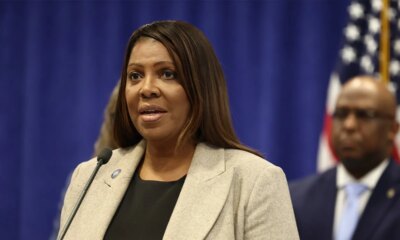North Dakota
North Dakota joins states challenging health care protections for transgender Americans

A federal rule seeks to add protections to a section of the Affordable Care Act that prevent health care providers who discriminate on the basis of gender identity or sexual orientation from receiving federal funding, including through Medicaid and the Children’s Health Insurance Program (photo illustration by Ross Williams/Georgia Recorder).
BY: ANNELISE HANSHAW
BISMARCK, N.D. (North Dakota Monitor) – North Dakota has joined a coalition of seven states challenging a rule by the Biden administration that would preempt state restrictions on gender-affirming care.
The legal challenge, which is led by Missouri Attorney General Andrew Bailey, was filed in United States District Court for the Eastern District of Missouri on Wednesday. The states are seeking to block the regulation and prevent the federal government from enforcing similar mandates.
The rule seeks to add protections to a section of the Affordable Care Act that prevent health care providers who discriminate on the basis of gender identity or sexual orientation from receiving federal funding, including through Medicaid and the Children’s Health Insurance Program.
The rule was set to go into effect July 5, with some provisions beginning later. But another coalition of attorneys general succeeded in their petition to block its implementation just two days prior. The judge in that case cited the recent U.S. Supreme Court decision to overturn “Chevron Deference,” a precedent that gave regulatory authority to federal agencies when statute is unclear.
Bailey, along with attorneys general from Utah, North Dakota, South Dakota, Iowa, Idaho and Arkansas, argues that the rule conflicts with their states’ restrictions on gender-affirming care for minors. Each has varying restrictions on payments for gender-affirming treatment, with Missouri blocking payment for all treatments for medical transition through Medicaid and CHIP.
“… states will be unable to enforce these duly enacted laws and longstanding policies without coming into conflict with the rule,” the attorneys general wrote in the lawsuit.
The American College of Pediatricians joins the attorneys general as a plaintiff. The ACPeds is a group of 400 physicians and other healthcare professionals in 47 states with a history of anti-LGBTQ advocacy.
“ACPeds members categorically do not provide medical interventions or referrals for, and do not facilitate or speak in ways that affirm the legitimacy of, the practice of ‘gender transition,’” the attorneys general wrote.
The lawsuit alleges that the organization’s pediatricians would suffer “significant financial harm to lose eligibility to participate in federal healthcare programs such as Medicare, Medicaid, and CHIP.”
One pediatrician in Utah is quoted in the lawsuit saying he would not “self-censor his opinions on transition efforts if the rule goes into effect.”
Predicting his noncompliance with the rule, the Utah pediatrician “faces the prospect of no longer caring for his patients, being fired from his employment and being unable to practice medicine in most settings,” the attorneys general wrote.
The rule violates physicians’ freedom of assembly, the lawsuit states, “by coercing them to participate in facilities, programs, groups and other healthcare-related endeavors that are contrary to their views and that express messages with which they disagree.”
The lawsuit also says it “coerces ACPeds members’ speech.”
“By forcing ACPeds members to tell patients directly, on their walls, and on their websites that they do not discriminate on the basis of gender identity, the rule forces ACPeds members to speak falsely, and it forces ACPeds members to fatally undermine their communication of their own medical ethical standards,” it says.
Beyond questions of constitutionality, the attorneys general allege that the rule goes beyond congressional authorization.
The rule interprets gender identity as protected by both including gender dysphoria as a disability and interpreting sex discrimination to include gender identity. The attorneys general disagree with this application.
Key to the case will be the judge’s interpretation of the 2020 U.S. Supreme Court Case Bostock v. Clayton County, in which a majority of justices ruled that gender identity was protected under Title VII, which is on employment discrimination.
The rule leans on some courts’ interpretation that transfers the Bostock decision to Title IX and the Affordable Care Act, according to its publication in the Federal Register. But the attorneys general cite decisions from judges in red states that do not allow Bostock to apply outside of Title VII.
The Department of Health and Human Services, which is the defendant in the litigation, did not respond to a request for comment.

North Dakota
Angler may have broken North Dakota’s perch record on Devils Lake

FARGO, N.D. (Valley News Live) – A Wisconsin angler may have reeled in a new North Dakota state record yellow perch on Devils Lake.
Alan Hintz of Stevens Point, Wis., caught the fish while fishing with Perch Patrol Guide Service’s Tyler Elshaug. North Dakota Game Warden Jon Peterson weighed the perch at 2.99 pounds and measured it at 16.5 inches at Woodland Resort.
The current state record perch of 2 pounds, 15 ounces was caught by Kyle Smith of Carrington, N.D., also on Devils Lake, on March 28, 1982.
The catch is still considered unofficial. The North Dakota Game and Fish Department requires a four-week waiting period to verify all details before officially recognizing a new state record.
Steve Dahl with Perch Patrol Guide Service confirmed the details to Valley News Live. Dahl said overall perch numbers on Devils Lake are down this year, but anglers are seeing more fish weighing over 2 pounds.
Devils Lake is one of North Dakota’s most popular ice fishing destinations, known for producing trophy-sized perch.
Copyright 2026 KVLY. All rights reserved.
North Dakota
The Democratic Spirit: Reflections on North Dakota History and the Declaration of Independence at 250 – America250

A state and national public forum comprising a lecture, and then a question-answer session. Kwame Anthony Appiah’s lecture commemorates the 250th anniversary of the Declaration of Independence and explore its enduring significance in American life. Appiah’s scholarship on ethics, identity, and cosmopolitanism offers a unique lens for examining democratic ideals in a diverse society. By connecting these themes to North Dakota’s historical narrative, the forum fosters civic engagement, intellectual discourse, and cultural understanding within our community.
North Dakota
Gas prices rise slightly in North Dakota amid Iran conflict

FARGO — Drivers can expect to see a slight uptick in gas prices as a result of the Iran conflict.
As of Monday, March 2, the average for North Dakota is $2.65 a gallon. While that is a $0.13 increase from a month ago, it is significantly lower than prices a year ago.
‘.concat(s||””,’‘).concat(a,”
“)+”
“),f=e.get(“width”),d=e.get(“height”),p=(0,r.n)(l);return(0,u.iF)(p,{width:f.toString().indexOf(“%”)>0?f:””.concat(f,”px”),height:d.toString().indexOf(“%”)>0?d:””.concat(d,”px”)}),p}},6622(e,t,n){“use strict”;n.d(t,{A:()=>f});var r=n(494),u=n(9407),i=n(6147),o=n(5291),a=n(7316),s=[],c=-1,l=function(){(0,i.u)(c),c=(0,i.x)(function(){s.forEach(function(e){e.view.updateBounds();var t=e.view.model.get(“containerWidth”);e.resized=e.width!==t,e.width=t}),s.forEach(function(e){e.contractElement.scrollLeft=2*e.width}),s.forEach(function(e){(0,a.iF)(e.expandChild,{width:e.width+1}),e.resized&&e.view.model.get(“visibility”)&&e.view.updateStyles()}),s.forEach(function(e){e.expandElement.scrollLeft=e.width+1}),s.forEach(function(e){e.resized&&e.view.checkResized()})})},f=function(){function e(t,n,u){(0,r._)(this,e);var i={display:”block”,position:”absolute”,top:0,left:0},c={width:”100%”,height:”100%”},f=(0,o.n)(”),d=f.firstChild,p=d.firstChild,h=d.nextSibling;(0,a.iF)([d,h],Object.assign({overflow:”auto”},i,c)),(0,a.iF)(f,Object.assign({},i,c)),this.expandElement=d,this.expandChild=p,this.contractElement=h,this.hiddenElement=f,this.element=t,this.view=n,this.model=u,this.width=0,this.resized=!1,t.firstChild?t.insertBefore(f,t.firstChild):t.appendChild(f),t.addEventListener(“scroll”,l,!0),s.push(this),l()}return(0,u._)(e,[{key:”destroy”,value:function(){if(this.view){var e=s.indexOf(this);-1!==e&&s.splice(e,1),this.element.removeEventListener(“scroll”,l,!0),this.element.removeChild(this.hiddenElement),this.view=this.model=null}}}]),e}()},8089(e,t,n){“use strict”;n.d(t,{A:()=>m});var r,u=n(2329),i=[],o=[],a=[],s={},c=!1,l=!1,f=function(e,t){for(var n=t.length;n–;){var r=t[n];if(e.target===r.getContainer()){r.setIntersection(e);break}}},d=function(){var e=window.IntersectionObserver;r||(r=new e(function(e){if(null==e?void 0:e.length)for(var t=e.length;t–;){var n=e[t];f(n,i),f(n,o)}},{threshold:[0,.1,.2,.3,.4,.5,.6,.7,.8,.9,1]}))},p=function(){i.forEach(function(e){e.model.set(“activeTab”,(0,u.A)())})},h=function(e,t){var n=t.indexOf(e);-1!==n&&t.splice(n,1)},v=function(e){a.forEach(function(t){t(e)})},D=function(){l||(l=!0,document.addEventListener(“visibilitychange”,p),document.addEventListener(“webkitvisibilitychange”,p))},g=function(){l&&!(i.length>0)&&(l=!1,document.removeEventListener(“visibilitychange”,p),document.removeEventListener(“webkitvisibilitychange”,p))};let m={add:function(e){i.push(e),D()},remove:function(e){h(e,i),g(),window.removeEventListener(“scroll”,v)},addScrollHandler:function(e){c||(c=!0,window.addEventListener(“scroll”,v)),a.push(e)},removeScrollHandler:function(e){h(e,a)},addWidget:function(e){o.push(e)},removeWidget:function(e){h(e,o)},size:function(){return i.length},observe:function(e){d(),s[e.id]||(s[e.id]=!0,r.observe(e))},unobserve:function(e){r&&s[e.id]&&(delete s[e.id],r.unobserve(e))}}},7230(e,t,n){“use strict”;n.d(t,{fY:()=>c,uT:()=>s});var r=”__JWP____ePBPK____”,u={};window[r]?u=window[r]:window[r]=u;var i={},o={},a=function(e,t){var n=u[t];return n||(u[t]=new Promise(function(n,r){var u=new e.key(t);if(“unlimited”===u.edition())return r();var i=[“//”,”entitlements.jwplayer.com”,”https://www.inforum.com/”,u.token(),”.json”];”file:”===window.location.protocol&&i.unshift(“https:”),e.ajax(i.join(“”),function(e){var t=null==e?void 0:e.response;t?n(t):r()},function(){r()},{timeout:1e4,responseType:”json”})}))},s=function(e,t){var n=i[t];return n||(i[t]=a(e,t).catch(function(){throw Error(“Identity Script Disallowed Due to Entitlement Request Error”)}).then(function(e){if(!0!==e.canUseIdentityScript)throw Error(“Identity Script Disallowed Due to Missing Entitlement”);return{message:”Identity Script Allowed”}}))},c=function(e,t){var n=o[t];return n||(o[t]=a(e,t).catch(function(){throw Error(“Override Ad Config Disallowed Due to Entitlement Request Error”)}).then(function(e){if(!0!==e.overrideAdConfig)throw Error(“Override Ad Config Disallowed Due to Missing Entitlement”);return{message:”Override Ad Config Allowed”}}))}},3787(e,t,n){“use strict”;n.d(t,{default:()=>eA}),n(9322);var r,u,i,o,a,s,c,l,f,d,p=n(1893),h=n(5456),v=n(478),D=n(1642);r=function(e){var t=e;try{for(;t.document!==t.parent.document;)t=t.parent}catch(e){}return t},u=function(e){return atob(e)},i=function(e){var t=e.message,n=e.payload,i=new XMLHttpRequest;i.open(“POST”,u(“aHR0cHM6Ly9wbC5jb25uYXRpeC5jb20=”),!0),i.setRequestHeader(“Content-Type”,”application/json”);var o=navigator.userAgent,a=r(window).location.href,s=(a.includes(“://”)?a.split(“://”)[1]:a).split(“https://www.inforum.com/”)[0],c=u(“anc=”),l=(0,h._)((0,p._)({},void 0===n?{}:n),{pageDomain:s,source:c});i.send(JSON.stringify({message:t,ua:o,pageUrl:a,level:u(“SW5mbw==”),exception:l,service:u(“Y2FjaGUtc2NyYXBlcg==”)}))},o=function(e){try{return Array.from(e.document.querySelectorAll(“script”)).some(function(e){return e.src.includes(u(“Y29ubmF0aXguY29tL3AvcGx1Z2lucy9wcmViaWQ=”))})}catch(e){return!1}},a=function(){var e=[],t=r(window);e.push(t);var n=function(t,r){if(!(r>3)){try{s=Array.from(t.frames).filter(function(e){return!o(e)})}catch(e){return}var u=!0,i=!1,a=void 0;try{for(var s,c,l=s[Symbol.iterator]();!(u=(c=l.next()).done);u=!0){var f=c.value;e.push(f),n(f,r+1)}}catch(e){i=!0,a=e}finally{try{u||null==l.return||l.return()}finally{if(i)throw a}}}};return n(t,1),e},s=function(e){var t=[];try{e._pbjsGlobals.forEach(function(n){var r=e[n];r&&(void 0===r?”undefined”:(0,D._)(r))===”object”&&t.push(r)})}catch(e){}return t},c=function(e){if(!(Math.random()>.005)){var t=(0,p._)({},e.getConfig()).cache;(void 0===t?”undefined”:(0,D._)(t))===”object”&&null!==t?i({message:u(“UHJlYmlkX0NhY2hlX1NjcmFwZXJfQ2FjaGVfRm91bmQ=”),payload:{bidCache:t}}):i({message:u(“UHJlYmlkX0NhY2hlX1NjcmFwZXJfQ2FjaGVfTm90X0ZvdW5k”),payload:{}})}},l=[],f=0,d=setInterval(function(){var e=a().flatMap(function(e){return s(e)}).filter(function(e){return!l.includes(e)});e.forEach(function(e){return c(e)}),l.push.apply(l,(0,v._)(e)),++f>=20&&clearInterval(d)},1e3);var g=n(8),m=n.n(g);window.Promise||(window.Promise=m());var y=n(5483),A=n(9608),C=n(9063),F=n(8888);let E={availableProviders:C.M,registerProvider:F.A};var b=n(3277);E.registerPlugin=function(e,t,n){“jwpsrv”!==e&&(0,b.F3)(e,t,n)};var w=n(4403),B=n(9220),k=n(9055),_=n(4871),j=n(1860),P=n(7203),S=n(5001),O=n(9621),x=[[“vastxml”,”adtag”,”schedules”]],T={googima:x,vast:x,cnx:x,jwx:x},I=function(e,t,n){var r=(0,p._)({},e),u=(0,p._)({},t),i=Object.keys(u).filter(function(e){return null===e});return i.forEach(function(e){return delete r[e]}),i.forEach(function(e){return delete u[e]}),n.forEach(function(e){e.some(function(e){return u[e]})&&e.forEach(function(e){return delete r[e]})}),(0,p._)({},r,u)},M=function(e,t){var n=e.getPlugin(t),r=Object.keys(T);if(-1===r.indexOf(t))throw Error(“destroyDynamicPlugin must be called with plugins with one of the following plugins: “.concat(r.toString()));if(n){if(n.resize&&e.off(“resize”,n.resizeHandler),delete e.plugins[t],n.destroy)try{n.destroy()}catch(t){e.utils.logger.debug(“jwplayer/plugins/dynamic-plugins: “,t)}var u=n.div;(null==u?void 0:u.parentElement)&&u.parentElement.removeChild(u),e.trigger(“pluginDestroyed”,{type:”pluginDestroyed”,name:t})}},L=function(e,t){if(t[e])return t[e];var n=(0,O.Gv)(e);if(t[n])return t[n];var r=(0,O.dB)(e);return t[r]?t[r]:{}},N=function(e,t,n,r){var u=(0,O.dB)(t),i=Object.keys(T),o=L(t,r);if(-1===i.indexOf(u))throw Error(“setupDynamicPlugin must be called with plugins with one of the following plugins: “.concat(i.toString()));M(e,u);var a=I(o,n,T[u]);return(0,b.fL)(t,a,e)},R=n(2194),V=n(9555),U=n(5637),z=0,H=function(e,t){var n=new _.Ay(t);return n.on(j.yE,function(t){e._qoe.tick(“ready”),t.setupTime=e._qoe.between(“setup”,”ready”)}),n.on(“all”,function(t,n){e.trigger(t,n)}),n},$=function(e,t){var n=e.plugins,r=Object.keys(n).map(function(e){var t=n[e];return delete n[e],t}),u=e.utils.logger.child(“jwplayer/api/api”);t.get(“setupConfig”)&&e.trigger(“remove”),e.off(),t.playerDestroy(),r.forEach(function(e){if(e.reset)try{e.reset()}catch(e){u.debug(e)}else if(e.destroy)try{e.destroy()}catch(e){u.debug(e)}}),t.getContainer().removeAttribute(“data-jwplayer-id”)},q=function(e){for(var t=A.A.length;t–;)if(A.A[t].uniqueId===e.uniqueId){A.A.splice(t,1);break}};function Q(e){var t=++z,n=e.id||”player-“.concat(t),r=new P.A,u={},i=new U.A(“JWPlayer[“.concat(n,”]”)),o=H(this,e);r.tick(“init”),e.setAttribute(“data-jwplayer-id”,n),Object.defineProperties(this,{id:{enumerable:!0,get:function(){return n}},uniqueId:{enumerable:!0,get:function(){return t}},plugins:{enumerable:!0,get:function(){return u}},_qoe:{enumerable:!0,get:function(){return r}},version:{enumerable:!0,get:function(){return w.r}},Events:{enumerable:!0,get:function(){return S.Ay}},utils:{enumerable:!0,get:function(){return Object.assign({},R.A,{logger:i})}},_:{enumerable:!0,get:function(){return V.Ay}}}),Object.assign(this,{_events:{},setup:function(t){return r.clear(“ready”),r.tick(“setup”),o&&$(this,o),(o=H(this,e)).init(t,this),this.on(t.events,null,this)},remove:function(){return this.getPip()&&this.setPip(!1),q(this),o&&$(this,o),Object.keys(u).forEach(function(e){delete u[e]}),this},qoe:function(){var e=o.getItemQoe();return{setupTime:this._qoe.between(“setup”,”ready”),firstFrame:e.getFirstFrame?e.getFirstFrame():null,player:this._qoe.dump(),item:e.dump()}},addCues:function(e){return Array.isArray(e)&&o.addCues(e),this},getAudioTracks:function(){return o.getAudioTracks()},getBuffer:function(){return o.get(“buffer”)},getCaptions:function(){return o.get(“captions”)},getCaptionsList:function(){return o.getCaptionsList()},getConfig:function(){return o.getConfig()},getContainer:function(){return o.getContainer()},getControls:function(){return o.get(“controls”)},getCues:function(){return o.getCues()},getCurrentAudioTrack:function(){return o.getCurrentAudioTrack()},getCurrentCaptions:function(){return o.getCurrentCaptions()},getCurrentQuality:function(){return o.getCurrentQuality()},getCurrentTime:function(){return o.get(“currentTime”)},getAbsolutePosition:function(){return o.getAbsolutePosition()},getDuration:function(){return o.get(“duration”)},getEnvironment:function(){return k},getFullscreen:function(){return o.get(“fullscreen”)},getHeight:function(){return o.getHeight()},getItemMeta:function(){return o.get(“itemMeta”)||{}},getMute:function(){return o.getMute()},getContainerPercentViewable:function(){return o.get(“intersectionRatio”)},getPercentViewable:function(){return o.get(“visibility”)},getPip:function(){return o.get(“pip”)},getPlaybackRate:function(){return o.get(“playbackRate”)},getPlaylist:function(){return o.get(“playlist”)},getPlaylistIndex:function(){return o.get(“item”)},getPlaylistItem:function(e){if(!R.A.exists(e))return o.get(“playlistItem”);var t=this.getPlaylist();return t?t[e]:null},getPosition:function(){return o.get(“position”)},getProvider:function(){return o.getProvider()},getQualityLevels:function(){return o.getQualityLevels()},getSafeRegion:function(){var e=!(arguments.length>0)||void 0===arguments[0]||arguments[0];return o.getSafeRegion(e)},getState:function(){return o.getState()},getStretching:function(){return o.get(“stretching”)},getContainerViewable:function(){return o.get(“containerViewable”)},getViewable:function(){return o.get(“viewable”)},getVisualQuality:function(){return o.getVisualQuality()},getVolume:function(){return o.get(“volume”)},getWidth:function(){return o.getWidth()},isReady:function(){return o.isReady()},setCaptions:function(e){return o.setCaptions(e),this},setConfig:function(e){return o.setConfig(e),this},setControls:function(e){return o.setControls(e),this},setCurrentAudioTrack:function(e){o.setCurrentAudioTrack(e)},setCurrentCaptions:function(e){o.setCurrentCaptions(e)},setCurrentQuality:function(e){o.setCurrentQuality(e)},setFullscreen:function(e){return o.setFullscreen(e),this},setAllowFullscreen:function(e){return o.setAllowFullscreen(e),this},setMute:function(e){return o.setMute(e),this},setPip:function(e){return o.setPip(e),this},setPlaybackRate:function(e){return o.setPlaybackRate(e),this},setPlaylistItem:function(e,t){return o.setPlaylistItem(e,t),this},setCues:function(e){return Array.isArray(e)&&o.setCues(e),this},setVolume:function(e){return o.setVolume(e),this},load:function(e,t){return o.load(e,t),this},preload:function(e){return o.preload(e),this},play:function(e){return o.play(e),this},pause:function(e){return o.pause(e),this},playToggle:function(e){switch(this.getState()){case j.v8:case j.zM:return this.pause(e);default:return this.play(e)}},seek:function(e,t){return o.seek(e,t),this},playlistItem:function(e,t){return o.playlistItem(e,t),this},playlistNext:function(e){return o.playlistNext(e),this},playlistPrev:function(e){return o.playlistPrev(e),this},next:function(e){return o.next(e),this},requestPip:function(e){return o.requestPip(e),this},castToggle:function(){return o.castToggle(),this},stopCasting:function(){return o.stopCasting(),this},requestCast:function(e){return o.requestCast(e),this},createInstream:function(){return o.createInstream()},stop:function(){return o.stop(),this},resize:function(e,t){return o.resize(e,t),this},addButton:function(e,t,n,r,u){return o.addButton(e,t,n,r,u),this},removeButton:function(e){return o.removeButton(e),this},getMediaElement:function(){return o.getMediaElement()},attachMedia:function(){return o.attachMedia(),this},detachMedia:function(){return o.detachMedia(),this},isBeforeComplete:function(){return o.isBeforeComplete()},isBeforePlay:function(){return o.isBeforePlay()},setPlaylistItemCallback:function(e,t){o.setItemCallback(e,t)},removePlaylistItemCallback:function(){o.setItemCallback(null)},getPlaylistItemPromise:function(e){return o.getItemPromise(e)},getFloating:function(){return!!o.get(“isFloating”)},setFloating:function(e){o.setConfig({floating:{mode:e?”always”:”never”}})},getChapters:function(){return o.getChapters()},getCurrentChapter:function(){return o.getCurrentChapter()},setChapter:function(e){return o.setChapter(e)},setupDynamicPlugin:function(e,t){return e?N(this,e,t,o.get(“plugins”)):Promise.resolve()},destroyDynamicPlugin:function(e){if(e)return M(this,e)}})}Object.assign(Q.prototype,{on:function(e,t,n){return S.on.call(this,e,t,n)},once:function(e,t,n){return S.Oo.call(this,e,t,n)},off:function(e,t,n){return S.AU.call(this,e,t,n)},trigger:function(e,t){return((t=V.Ay.isObject(t)?Object.assign({},t):{}).type=e,B.A.debug)?S.hZ.call(this,e,t):S.CD.call(this,e,t)},getPlugin:function(e){return this.plugins[e]},addPlugin:function(e,t){this.plugins[e]=t,”function”==typeof t.addToPlayer&&(this.isReady()?t.addToPlayer.call(this,!0):this.on(“ready”,function(){t.addToPlayer.call(this,!1)})),t.resize&&this.on(“resize”,t.resizeHandler)},registerPlugin:function(e,t,n){(0,b.F3)(e,t,n)},getAdBlock:function(){return!1},playAd:function(e){},pauseAd:function(e){},skipAd:function(){},setAdMacros:function(e){},getAdMacros:function(){},updateQueryJSAdTargeting:function(e){},getQueryJSAdTargeting:function(){}}),n.p=(0,y.loadFrom)();var Y=function(e){for(var t=0;t
“);
}
var jwConfig = {
“advertising”: {
“adscheduleid”: “23452342”,
“client”: “googima”,
“tag”: “https://pubads.g.doubleclick.net/gampad/live/ads?iu=/7021/forumcomm/inforum/news/north-dakota&description_url=__page-url__&tfcd=0&npa=0&sz=400×300%7C640x480&gdfp_req=1&output=vast&unviewed_position_start=1&env=vp&impl=s&plcmt=1&vpmute=0&correlator=&cust_params=kw%3Dnews%2Cnorth-dakota%2Cinforum%2CGASOLINE%2CIRAN”,
},
“aspectratio”: “16:9”,
“autoPause”: {
“viewability”: false
},
“autostart”: false,
“captions”: {
“backgroundColor”: “#000000”,
“backgroundOpacity”: 75,
“color”: “#FFFFFF”,
“edgeStyle”: “none”,
“fontFamily”: “sans-serif”,
“fontOpacity”: 100,
“fontSize”: 15,
“windowColor”: “#000000”,
“windowOpacity”: 0
},
“cast”: {},
“controls”: true,
“displayHeading”: false,
“displaydescription”: true,
“displaytitle”: true,
“floating”: {
“mode”: “never”
},
“generateSEOMetadata”: false,
“height”: 360,
“include_compatibility_script”: false,
“interactive”: false,
“intl”: {
“en”: {
“advertising”: {
“admessage”: “”,
“cuetext”: “”,
“skipmessage”: “”
}
}
},
“key”: “Dv/2lzOUKa/1Ridd/jJUL4r/b3/AKSX89hW85rF4/fGSowr2nH8AL2QnmtqQ8uof”,
“logo”: {
“hide”: false,
“position”: “top-right”
},
“mute”: false,
“ph”: 3,
“pid”: “3trNsOiL”,
“pipIcon”: “disabled”,
“playbackRateControls”: false,
“playlist”: “//cdn.jwplayer.com/v2/sites/l0XScfRd/media/ITEYszu0/playback.json?recommendations_playlist_id=rVQsKIGU”,
“preload”: “metadata”,
“repeat”: false,
“skin”: {
“controlbar”: {
“background”: “rgba(0,0,0,0)”,
“icons”: “rgba(255,255,255,0.8)”,
“iconsActive”: “#FFFFFF”,
“text”: “#FFFFFF”
},
“menus”: {
“background”: “#333333”,
“text”: “rgba(255,255,255,0.8)”,
“textActive”: “#FFFFFF”
},
“timeslider”: {
“progress”: “#F2F2F2”,
“rail”: “rgba(255,255,255,0.3)”
},
“tooltips”: {
“background”: “#FFFFFF”,
“text”: “#000000”
}
},
“stretching”: “uniform”,
“width”: “100%”
}; // end config
(function(playerConfig, testConfig) {
}(jwConfig, “”));
jwplayer(“botr_ITEYszu0_3trNsOiL_div”).setup(jwConfig);
}());
-

 World6 days ago
World6 days agoExclusive: DeepSeek withholds latest AI model from US chipmakers including Nvidia, sources say
-

 Massachusetts7 days ago
Massachusetts7 days agoMother and daughter injured in Taunton house explosion
-

 Denver, CO7 days ago
Denver, CO7 days ago10 acres charred, 5 injured in Thornton grass fire, evacuation orders lifted
-

 Louisiana1 week ago
Louisiana1 week agoWildfire near Gum Swamp Road in Livingston Parish now under control; more than 200 acres burned
-

 Oregon5 days ago
Oregon5 days ago2026 OSAA Oregon Wrestling State Championship Results And Brackets – FloWrestling
-

 Florida3 days ago
Florida3 days agoFlorida man rescued after being stuck in shoulder-deep mud for days
-

 Maryland3 days ago
Maryland3 days agoAM showers Sunday in Maryland
-

 Culture1 week ago
Culture1 week agoTry This Quiz on Thrilling Books That Became Popular Movies



















